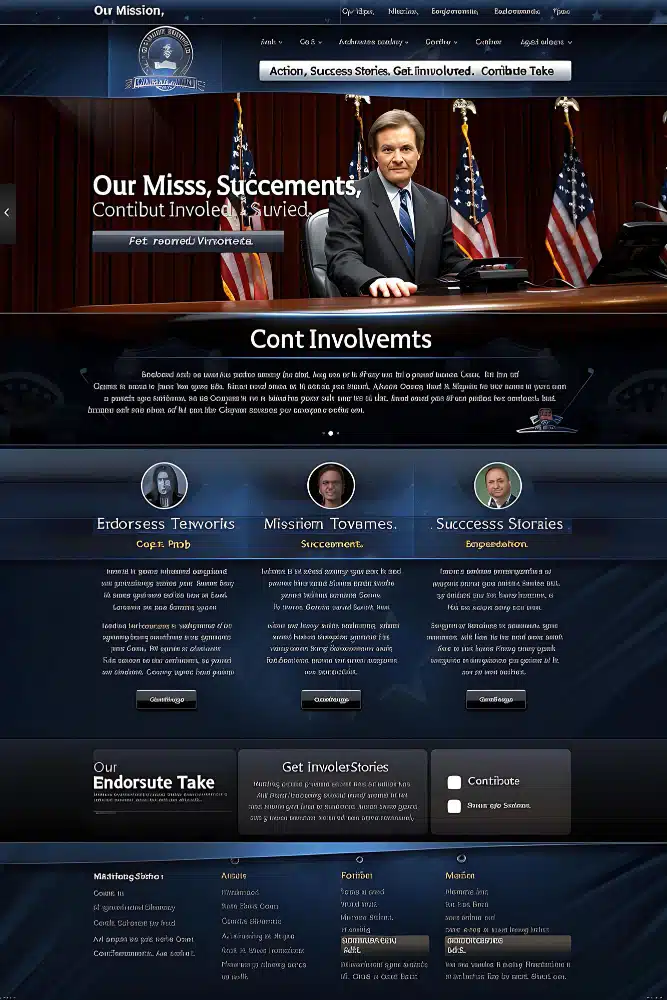LAW FIRM WEBSITE DESIGN
Are you looking to take your law firm’s online presence to the next level? Look no further than NexxtClient, the experts in stunning website design that will boost your firm’s visibility and credibility.
In today’s digital world, having a strong online presence is essential for success. Potential clients often turn to the internet to find legal services, and a captivating website can make all the difference in capturing their attention. NexxtClient understands the unique needs of law firms and specializes in creating websites that showcase your brand in the best possible light.
With their expertise in website design, NexxtClient ensures that your law firm’s website is not only visually stunning, but also user-friendly and optimized for search engines. They understand the importance of utilizing the right keywords and SEO strategies to ensure that your website ranks high in search engine results, driving more traffic and potential clients to your firm.
Don’t let your law firm get left behind in the competitive online landscape. Trust NexxtClient to unleash the power of stunning website design and give your firm the boost it deserves.
The importance of online presence for law firms
In today’s digital age, having a strong online presence is crucial for the success of any law firm. Potential clients increasingly turn to the internet to search for legal services, and a firm’s online presence can make or break their ability to attract new business. A well-designed, informative, and easily navigable website is often the first point of contact between a law firm and its prospective clients.
An online presence allows law firms to showcase their expertise, build trust with potential clients, and differentiate themselves from the competition. By maintaining an active online presence, law firms can reach a wider audience, establish their brand, and demonstrate their commitment to providing exceptional legal services. Furthermore, a strong online presence can enhance a firm’s credibility and reputation, as clients are more likely to trust and engage with a law firm that has a professional and user-friendly digital presence.
Failing to invest in an effective online presence can put a law firm at a significant disadvantage. In a crowded legal market, firms that lack a robust digital strategy may struggle to attract new clients, retain existing ones, and stay ahead of their competitors. By prioritizing the development of a compelling online presence, law firms can position themselves as thought leaders in their respective practice areas, build stronger relationships with their clients, and ultimately drive business growth.


The role of website design in enhancing online presence
A law firm’s website is often the centerpiece of its online presence, serving as a digital storefront that showcases the firm’s capabilities, services, and brand. The design of a law firm’s website plays a crucial role in shaping the firm’s online presence and influencing the perceptions of potential clients.
A well-designed website can effectively communicate a law firm’s unique value proposition, establish trust and credibility, and provide a seamless user experience. By incorporating visually appealing and intuitive design elements, law firms can create a lasting impression on visitors and differentiate themselves from their competitors. Conversely, a poorly designed website can undermine a firm’s credibility, frustrate users, and ultimately drive potential clients away.
Effective website design for law firms goes beyond aesthetic appeal; it also involves optimizing the site’s functionality, navigation, and content to ensure that visitors can easily find the information they need. By prioritizing user experience, law firms can enhance their online presence and build stronger connections with their target audience. A well-designed website can also improve a firm’s search engine visibility, making it more likely for potential clients to discover and engage with the firm’s services.
Understanding the power of stunning website design
The power of stunning website design for law firms cannot be overstated. In a digital landscape where competition for clients is fierce, a visually captivating and user-friendly website can be the key to standing out from the crowd.
Stunning website design not only enhances the overall aesthetic appeal of a law firm’s online presence but also plays a crucial role in shaping the firm’s brand identity and positioning. A well-designed website can convey professionalism, expertise, and attention to detail – all of which are essential qualities that potential clients seek in a legal service provider.
Moreover, stunning website design can foster a sense of trust and credibility with visitors. When potential clients encounter a visually appealing and well-organized website, they are more likely to perceive the law firm as competent, reliable, and worthy of their business. This can be particularly important in the legal industry, where clients often place a high value on the reputation and trustworthiness of their legal counsel.
By investing in stunning website design, law firms can enhance their online visibility, improve user engagement, and ultimately drive more conversions. A visually captivating website can serve as a powerful marketing tool, attracting potential clients and showcasing the firm’s capabilities in a way that traditional advertising or marketing efforts simply cannot match.


Elements of a visually appealing law firm website
Crafting a visually appealing law firm website requires a keen understanding of design principles and the unique needs of the legal industry. From the strategic use of color and typography to the seamless integration of multimedia elements, every aspect of the website’s design should work in harmony to create a cohesive and professional online presence.
One of the key elements of a visually appealing law firm website is a clean and well-organized layout. By adopting a minimalist approach to design, law firms can create a sense of sophistication and elegance, while also ensuring that visitors can easily navigate the site and find the information they need. Thoughtful use of white space, strategic placement of content, and intuitive navigation menus can all contribute to a visually appealing and user-friendly website.
Another important aspect of a visually appealing law firm website is the effective use of imagery and multimedia. High-quality photographs, videos, and infographics can help to bring the firm’s brand and services to life, engaging visitors and making a lasting impression. These visual elements should be carefully selected and integrated into the website’s design to complement the overall aesthetic and reinforce the firm’s brand identity.
Typography also plays a crucial role in the visual appeal of a law firm’s website. The choice of fonts, font sizes, and font styles can convey a sense of professionalism, authority, and sophistication. By selecting typography that is both legible and visually appealing, law firms can ensure that their website’s content is easy to read and engaging for visitors.
Optimizing website design for user experience
Crafting a visually appealing law firm website is only one piece of the puzzle; equally important is ensuring that the website is optimized for a seamless user experience. By prioritizing user experience (UX) in the website design process, law firms can create a digital environment that is not only visually stunning but also highly intuitive and user-friendly.
At the heart of effective UX design for law firm websites is a deep understanding of the target audience and their needs. By conducting thorough user research and analyzing the behavior and preferences of potential clients, law firms can develop a website that anticipates and addresses their pain points, providing a tailored and satisfying experience.
One key aspect of optimizing website design for user experience is the implementation of a clear and intuitive navigation system. Visitors to a law firm’s website should be able to easily find the information they need, whether it’s details about the firm’s practice areas, attorney profiles, or client testimonials. By organizing the website’s content in a logical and user-friendly manner, law firms can ensure that visitors can quickly and effortlessly navigate the site and engage with the firm’s services.
Another critical element of UX-focused website design is the optimization of content presentation. Law firms should strive to strike a balance between providing comprehensive and informative content and presenting it in a way that is easily digestible and engaging for visitors. This may involve the use of concise and scannable text, strategically placed calls-to-action, and multimedia elements that enhance the overall user experience.


Incorporating responsive design for mobile compatibility
In today’s mobile-centric world, the importance of responsive website design for law firms cannot be overstated. With an increasing number of potential clients accessing legal services through their smartphones and tablets, law firms must ensure that their online presence is optimized for seamless mobile experiences.
Responsive website design refers to the practice of creating websites that automatically adapt to the screen size and device being used, ensuring a consistent and user-friendly experience across all platforms. By implementing responsive design, law firms can ensure that their website content, navigation, and visual elements are optimized for mobile devices, providing visitors with a smooth and engaging experience regardless of the device they are using.
The benefits of responsive website design for law firms are numerous. Firstly, it enhances the accessibility and reach of the firm’s online presence, as potential clients can easily access the website and its content from any device. This, in turn, can lead to increased engagement, higher conversion rates, and ultimately, more business opportunities for the law firm.
Moreover, responsive design can also positively impact a law firm’s search engine optimization (SEO) efforts. Google and other major search engines prioritize mobile-friendly websites in their search rankings, as they recognize the importance of providing users with a seamless mobile experience. By ensuring that their website is responsive, law firms can improve their visibility in search results, making it more likely for potential clients to discover and engage with their services.
The impact of website speed on user engagement
In the fast-paced digital landscape, website speed has become a critical factor in determining the success of a law firm’s online presence. Potential clients today expect websites to load quickly and efficiently, and any delays or slow loading times can have a significant impact on user engagement and satisfaction.
Slow website speed can lead to a range of negative consequences for law firms, including high bounce rates, decreased time spent on the website, and ultimately, lost business opportunities. When a website takes too long to load, visitors are more likely to become frustrated and abandon the site, seeking alternative legal service providers that can offer a more seamless and responsive online experience.
Optimizing website speed is not only crucial for enhancing the user experience but also for improving a law firm’s search engine rankings. Search engines, such as Google, prioritize fast-loading websites in their algorithms, as they recognize that page speed is a key factor in user satisfaction and engagement. By ensuring that their website loads quickly and efficiently, law firms can improve their visibility in search results, making it more likely for potential clients to discover and engage with their services.
To achieve optimal website speed, law firms should work closely with their web design and development team to implement a range of strategies, such as optimizing image and media files, minimizing the use of heavy plugins or scripts, and leveraging content delivery networks (CDNs) to reduce server response times. By prioritizing website speed, law firms can create a seamless and engaging online experience for their visitors, ultimately driving more conversions and business growth.


Utilizing effective call-to-actions on your website
In the context of a law firm’s website, effective call-to-actions (CTAs) play a crucial role in driving conversions and generating new business opportunities. CTAs are the strategic placement of buttons, links, or other interactive elements that encourage visitors to take a specific action, such as scheduling a consultation, requesting a quote, or downloading a resource.
Crafting impactful CTAs for a law firm’s website requires a deep understanding of the target audience and their pain points. By carefully analyzing the behavior and preferences of potential clients, law firms can develop CTAs that speak directly to their needs and motivations, increasing the likelihood of conversion. Effective CTAs should be clear, concise, and visually compelling, using action-oriented language that compels visitors to take the desired action.
The strategic placement of CTAs throughout a law firm’s website is also essential for maximizing their impact. CTAs should be prominently displayed in key areas of the website, such as the homepage, service pages, and contact sections, ensuring that visitors can easily find and engage with them. Additionally, law firms should consider incorporating multiple CTAs throughout the website, allowing visitors multiple opportunities to connect with the firm and take the next step in their legal journey.
By leveraging effective CTAs, law firms can not only enhance the user experience of their website but also drive tangible business results. Visitors who engage with CTAs are more likely to become leads, and ultimately, clients, as they have demonstrated a clear interest in the firm’s services. By optimizing their CTAs, law firms can maximize their online conversions and position themselves for long-term growth and success.
Showcasing your expertise through compelling content
In the competitive legal landscape, the ability to showcase your firm’s expertise and thought leadership through compelling content can be a powerful differentiator. A law firm’s website serves as a prime platform for sharing valuable insights, industry-specific knowledge, and thought-provoking perspectives that can attract and engage potential clients.
By developing a content strategy that aligns with the needs and interests of their target audience, law firms can establish themselves as trusted authorities in their respective practice areas. This may involve creating informative blog posts, in-depth case studies, or educational resources that address the common pain points and legal concerns of potential clients. Through this content, law firms can demonstrate their deep understanding of the legal landscape, their commitment to client success, and their ability to provide tailored solutions to complex legal challenges.
Effective content creation for law firm websites goes beyond simply sharing information; it involves crafting compelling narratives that captivate the reader and leave a lasting impression. By incorporating engaging storytelling techniques, law firms can humanize their brand, connect with their audience on an emotional level, and ultimately, build stronger relationships with potential clients. Whether it’s highlighting the firm’s history, showcasing client success stories, or introducing the firm’s attorneys, the content should be designed to resonate with the target audience and showcase the firm’s unique value proposition.
By investing in a robust content strategy, law firms can not only enhance their online presence but also position themselves as thought leaders in their industry. This can lead to increased visibility, improved search engine rankings, and ultimately, more opportunities to connect with and convert potential clients. By leveraging the power of compelling content, law firms can differentiate themselves from the competition and establish themselves as the go-to legal service providers in their respective practice areas.

The benefits of partnering with NexxtClient for your law firm's website design
When it comes to enhancing your law firm’s online presence through stunning website design, partnering with NexxtClient can be a game-changer. As experts in the field of website design and development, NexxtClient understands the unique needs and challenges of the legal industry, and they are dedicated to creating visually appealing and user-friendly websites that drive tangible results for their clients.
One of the key benefits of working with NexxtClient is their deep understanding of the legal landscape. They have extensive experience in designing websites for law firms, and they know how to effectively communicate a firm’s brand, services, and expertise through a compelling online presence. By collaborating closely with your firm, NexxtClient can help you craft a website that not only looks stunning but also resonates with your target audience and aligns with your overall business goals.
In addition to their design expertise, NexxtClient also specializes in optimizing websites for search engine visibility and user experience. They understand the importance of incorporating effective SEO strategies, responsive design, and intuitive navigation to ensure that your website attracts and engages potential clients. By partnering with NexxtClient, your law firm can benefit from a comprehensive digital solution that enhances your online presence and drives measurable results.
Furthermore, NexxtClient’s commitment to exceptional customer service sets them apart in the industry. They work closely with their clients throughout the entire website design and development process, ensuring that their needs and preferences are taken into account at every step. This collaborative approach allows law firms to have a direct say in the creation of their digital presence, resulting in a website that truly reflects the firm’s unique identity and values.
If you’re ready to take your law firm’s online presence to new heights, partnering with NexxtClient is the solution you’ve been searching for. With their expertise, creativity, and unwavering dedication to client success, NexxtClient can help you unleash the power of stunning website design and position your firm for long-term growth and success in the digital landscape.
OTHER LAW FIRM DIGITAL MARKETING SERVICES WE OFFER
SEO or Search Engine Optimization is a crucial part of Law Firm Marketing. If you want to be found online above your competitors then you need SEO. Unfortunately many agencies claim to know SEO but fall short in the long run. NexxtClient is a Top-Rated Law Firm SEO Agency with proven results.
1
Social Media is important for law firms and attorneys on so many different levels. With social media your firm is able to build brand awareness, showcase achievements, and share your accomplishments in the communities you serve.
2
PPC or Pay Per Click is another crucial aspect of Digital Marketing for Law Firms. One of the biggest hurdles of PPC for law firms to overcome is the cost. Although cost can't always be fully controlled, ROI or Return On Investment can be optimized.
3
CRO or Conversion Rate Optimization is one of the most important aspects of a successful Law Firm Digital Marketing Campaign. With SEO and PPC you maybe able to get a very large amount of Website traffic but unless it converts into quality leads then its pointless.
4
Frequently Asked Questions About Law Firm Website Design: Demystifying the Process for a Powerful Online Presence
What's the importance of a professional website for law firms?
In today’s digital age, a professional website has become a crucial asset for law firms looking to establish a strong online presence. Your law firm’s website serves as the first point of contact for potential clients, and it plays a significant role in shaping their perceptions of your firm’s expertise, credibility, and services.
A well-designed and informative website can help you attract and retain clients, showcase your firm’s unique strengths, and differentiate you from your competitors. It serves as a virtual storefront, allowing potential clients to learn about your practice areas, attorney profiles, and the value you can offer. An effective website can also help you build trust and rapport with your audience, ultimately leading to more client inquiries and conversions.
Furthermore, a professional website can enhance your firm’s overall marketing and branding efforts. It provides a platform to share your firm’s story, showcase your achievements, and communicate your core values. By investing in a high-quality website, you can elevate your firm’s online reputation, improve search engine visibility, and position yourself as a trusted and reliable legal service provider in your local market or industry niche.
What in Involved in the process of law firm website design?
Designing a law firm website is a multifaceted process that requires careful planning, strategic thinking, and collaboration between your firm and the web design agency you choose to work with. The process typically involves several key stages, each of which plays a crucial role in the successful development of your online presence.
The first step is to define your website’s goals and objectives. This involves understanding your target audience, their needs and pain points, and how your law firm can provide solutions. You’ll also need to consider the specific features and functionalities you want to include on your website, such as attorney bios, practice area pages, a client portal, or a blog.
Once the goals and requirements are established, the web design agency will work with you to develop a comprehensive strategy for your website. This may include conducting market research, analyzing your competitors, and creating a detailed sitemap and wireframes to ensure the user experience is intuitive and engaging. The design phase then follows, where the agency will create a visually appealing and brand-consistent layout, incorporating your firm’s logo, color scheme, and imagery.
The development stage involves the actual coding and implementation of your website, ensuring it is built on a robust and secure content management system (CMS) that allows for easy updates and maintenance. Throughout this process, your law firm will work closely with the design agency to provide feedback, review progress, and ensure the final product aligns with your vision and objectives.
What are some key elements of an effective law firm website?
To create an effective law firm website that resonates with your target audience and drives conversions, there are several key elements to consider. These elements work together to create a cohesive and user-friendly online experience for your potential clients.
One of the most crucial elements is the homepage, which serves as the entry point for visitors. Your homepage should be visually striking, clearly communicate your firm’s unique value proposition, and guide users to the most relevant information or actions, such as contacting your firm or learning about your services. The homepage should also feature engaging content, such as attorney bios, client testimonials, or highlighted case studies, to build trust and credibility.
Another essential element is the navigation menu, which should be intuitive and well-organized, making it easy for users to find the information they need. This may include clear categorization of your practice areas, a dedicated “About Us” section, and easy access to contact information. The website’s overall information architecture and content structure should be carefully planned to ensure a seamless user experience.
Additionally, your law firm’s website should showcase your attorneys’ expertise and credentials, highlighting their qualifications, areas of specialization, and notable achievements. This can be achieved through comprehensive attorney profiles, which may include professional headshots, detailed biographies, and client reviews or testimonials. By highlighting your team’s expertise, you can demonstrate your firm’s capabilities and build trust with potential clients.
What are some common challenges in law firm website design?
While designing an effective law firm website can be a rewarding process, it is not without its challenges. Understanding and addressing these challenges can help ensure a smooth and successful website development experience.
One common challenge is striking the right balance between visual appeal and functionality. Law firms often strive to create a website that is visually stunning, but this can sometimes come at the expense of user-friendliness and ease of navigation. It’s crucial to work with your web design agency to find a harmonious blend of aesthetics and usability, ensuring that your website not only looks impressive but also provides a seamless and intuitive experience for your visitors.
Another challenge is effectively communicating the complex and often technical nature of legal services in a clear and engaging manner. Law firms must find ways to present their expertise and service offerings in a way that is easily digestible for their target audience, without oversimplifying or sacrificing the depth of information. This may involve the use of strategic content formatting, visual aids, and a careful consideration of the language and tone used throughout the website.
Additionally, maintaining a consistent and cohesive brand identity across your law firm’s website can be a significant challenge, especially if your firm has a diverse range of practice areas or a large team of attorneys. Ensuring that your website design, messaging, and overall brand presence align with your firm’s values and positioning can be a delicate balancing act, requiring close collaboration between your firm and the web design agency.
How to choose the right website design agency for your law firm?
Selecting the right website design agency to partner with is a critical decision that can have a significant impact on the success of your law firm’s online presence. When evaluating potential agencies, there are several key factors to consider to ensure you find the best fit for your firm’s unique needs and goals.
One of the most important factors is the agency’s experience and expertise in designing websites for law firms specifically. Look for agencies that have a proven track record of working with legal clients and understand the unique requirements and challenges of the legal industry. These agencies will be better equipped to translate your firm’s brand, services, and value proposition into an effective online presence.
Another crucial consideration is the agency’s portfolio and the quality of their previous work. Review their past projects to assess the design aesthetic, user experience, and overall effectiveness of their websites. This can give you a good indication of their capabilities and help you determine if their style and approach aligns with your firm’s preferences.
It’s also essential to evaluate the agency’s communication and project management processes. A reliable and responsive web design agency will work closely with you throughout the entire project, providing regular updates, seeking your feedback, and ensuring a smooth and collaborative experience. This level of transparency and partnership can be invaluable in ensuring your law firm’s website meets your expectations.
What are some cost considerations for law firm website design?
When it comes to law firm website design, the cost can vary significantly depending on a variety of factors. Understanding these cost considerations can help you budget and plan for your website development project effectively.
One of the primary factors that impact the cost of law firm website design is the complexity and scope of the project. Websites with more pages, custom features, and advanced functionality will generally be more expensive than simpler, more straightforward designs. Factors such as the inclusion of a client portal, e-commerce capabilities, or complex content management systems can all contribute to higher costs.
The level of customization and branding required for your law firm’s website is another significant cost consideration. Websites that feature a highly customized design, incorporating your firm’s unique visual identity, imagery, and messaging, will typically be more expensive than templates or off-the-shelf solutions. However, a customized approach can also result in a more cohesive and impactful online presence.
The experience and expertise of the web design agency you choose to work with can also influence the overall cost of your project. Agencies with a proven track record in the legal industry and a reputation for delivering high-quality results may charge higher rates, but the investment can be justified by the value they bring to the table.
What are the best practices for optimizing your law firm website for search engines?
In today’s digital landscape, search engine optimization (SEO) is a crucial component of an effective law firm website. By optimizing your website for search engines, you can improve your firm’s visibility, attract more qualified leads, and ultimately drive more conversions. Here are some best practices to consider when optimizing your law firm’s website for search engines.
One of the most important elements of SEO is conducting thorough keyword research to identify the terms and phrases your target audience is using to search for legal services. By incorporating these keywords throughout your website’s content, including page titles, meta descriptions, and headers, you can enhance your website’s relevance and improve its search engine rankings.
Another key aspect of SEO for law firms is creating high-quality, informative content that provides value to your target audience. This can include blog posts, articles, or resources that address common legal questions or concerns. By positioning your firm as a thought leader and trusted source of information, you can improve your website’s authority and credibility in the eyes of search engines.
Additionally, ensuring your website’s technical foundation is optimized for search engines is crucial. This includes ensuring your website is mobile-friendly, has a fast loading speed, and is structured in a way that search engines can easily crawl and index. Working with a web design agency that specializes in SEO can help you identify and address any technical issues that may be hindering your website’s search engine performance.
How to Incorporate user-friendly features in your law firm website?
When it comes to designing an effective law firm website, user-friendliness is a critical consideration. By incorporating features that enhance the overall user experience, you can improve engagement, increase conversions, and build stronger relationships with your potential clients.
One essential user-friendly feature is a clear and intuitive navigation menu. Your website’s navigation should be well-organized, allowing visitors to easily find the information they need, whether it’s your practice areas, attorney profiles, or contact information. Consider using drop-down menus or a sticky navigation bar to ensure users can quickly access the content they’re looking for.
Another important feature is a robust search functionality, which can be particularly helpful for law firm websites with extensive content or service offerings. By providing users with the ability to search for specific topics, practice areas, or attorney names, you can help them quickly find the information they need and improve their overall experience on your website.
Incorporating interactive elements, such as chatbots or contact forms, can also enhance the user-friendliness of your law firm’s website. These features allow visitors to engage with your firm directly, ask questions, and request more information without having to navigate away from your website. This can lead to increased lead generation and a more personalized user experience.
What is mobile responsiveness and its impact on law firm websites?
In today’s digital landscape, where the majority of web traffic comes from mobile devices, the importance of mobile responsiveness for law firm websites cannot be overstated. A website that is not optimized for mobile devices can result in a poor user experience, increased bounce rates, and ultimately, a negative impact on your firm’s online presence.
A mobile-responsive website ensures that your law firm’s online presence is seamlessly accessible and user-friendly across a wide range of devices, from smartphones to tablets. This means that the layout, content, and functionality of your website will automatically adjust and adapt to the screen size and orientation of the device being used, providing a consistent and intuitive experience for your visitors.
By prioritizing mobile responsiveness in your law firm’s website design, you can improve the overall user experience, increase engagement, and enhance your firm’s credibility. Mobile-friendly features, such as easy-to-navigate menus, click-to-call functionality, and optimized form submissions, can make it effortless for potential clients to interact with your firm and access the information they need, regardless of the device they’re using.
Moreover, search engines, such as Google, have placed a significant emphasis on mobile-friendliness as a ranking factor. Websites that are not optimized for mobile devices are more likely to receive lower search engine rankings, which can negatively impact your firm’s visibility and lead generation efforts. By ensuring your law firm’s website is mobile-responsive, you can improve your search engine rankings and reach a wider audience of potential clients.
Types Of Law Firms We Partner With
We have partnered with hundreds of different law firms from all over the US to help them grow their practice.










